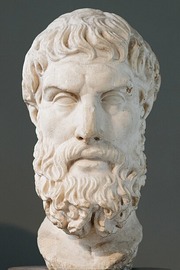en.wikipedia.org
Always private
DuckDuckGo never tracks your searches.
Learn MoreYou can hide this reminder in Search Settings
All regions
Argentina
Australia
Austria
Belgium (fr)
Belgium (nl)
Brazil
Bulgaria
Canada (en)
Canada (fr)
Catalonia
Chile
China
Colombia
Croatia
Czech Republic
Denmark
Estonia
Finland
France
Germany
Greece
Hong Kong
Hungary
Iceland
India (en)
Indonesia (en)
Ireland
Israel (en)
Italy
Japan
Korea
Latvia
Lithuania
Malaysia (en)
Mexico
Netherlands
New Zealand
Norway
Pakistan (en)
Peru
Philippines (en)
Poland
Portugal
Romania
Russia
Saudi Arabia
Singapore
Slovakia
Slovenia
South Africa
Spain (ca)
Spain (es)
Sweden
Switzerland (de)
Switzerland (fr)
Taiwan
Thailand (en)
Turkey
Ukraine
United Kingdom
US (English)
US (Spanish)
Vietnam (en)
Safe search: moderate
Strict
Moderate
Off
Any time
- Was this helpful?
- Epicureanism is a system of philosophy founded by Epicurus, an ancient Greek atomist and materialist. It teaches that pleasure is the sole intrinsic goal, but not the hedonism of modern usage, and that the universe consists of atoms and void.
britannica.com
Nov 8, 2024Epicureanism is the philosophy of Epicurus (341-270 BCE), who taught that pleasure is the chief good and that gods are unconcerned with human affairs. Learn about the basic concepts, history, works, and legacy of Epicureanism and its followers.- Videos for EpicureanismWas this helpful?
plato.stanford.edu
Stanford Encyclopedia of Philosophy
https://plato.stanford.edu › entries › epicurus
1. Sources. The major source for Epicurean doctrine is Diogenes Laertius' third-century C.E. Lives of Eminent Philosophers, a compilation of information on the lives and doctrines of the philosophers of classical Greece (see "Doxography of Ancient Philosophy").In the tenth and final book, devoted to Epicureanism, Diogenes preserves three of Epicurus' letters to his disciples, in which ...newworldencyclopedia.org
New World Encyclopedia
https://www.newworldencyclopedia.org › entry › Epicureanism
Epicureanism is a system of philosophy based on the teachings of Epicurus, who advocated happiness, tranquility, and moderation as the ultimate goals of human life. Learn about its origins, schools, writings, and contributions to modern thought, as well as its contrast with hedonism and its role in the Renaissance.iep.utm.edu
Internet Encyclopedia of Philosophy
https://iep.utm.edu › epicur
Learn about Epicurus, one of the major philosophers in the Hellenistic period, who developed a materialistic metaphysics, empiricist epistemology, and hedonistic ethics. Explore his sources, arguments, and legacy in this comprehensive article.britannica.com
Learn about the metaphysical and ethical doctrines of Epicureanism, taught by the Greek philosopher Epicurus. Find out how Epicureanism influenced later thinkers such as Pierre Gassendi, Epicurus, and Lucretius.rep.routledge.com
Routledge Encyclopedia of Philosophy
https://www.rep.routledge.com › articles › thematic › epicureanism › v-1
Epicureanism is a Hellenistic philosophy founded by Epicurus, based on atomism, empiricism and hedonism. Learn about its main features, such as the swerve doctrine, the gods, the criteria of truth and the good life.britannica.com
Nov 8, 2024Epicureanism - Hedonism, Atomism, Pleasure: Philosophy was, for Epicurus, the art of living, and it aimed at the same time both to assure happiness and to supply means to achieve it. As for science, Epicurus was concerned only with the practical end in view. If possible, he would have done without it. "If we were not troubled by our suspicions of the phenomena of the sky and about death ...simple.wikipedia.org
Epicureanism is a philosophy based on the teachings of Epicurus. It started about 307 BC. Epicurus was a materialist who believed that material was made of atoms. The teaching about atoms was first started by Democritus. Epicurus forcefully attacked superstition.epicurus.net
epicurus.net
https://epicurus.net
The Epicurus & Epicurean Philosophy web site is a modern on-line version of the Garden, introducing Epicureanism to both the serious student of philosophy and to anyone seeking useful and inspiring ideas, and helping to bring together those who are interested in it. Follow the links below to learn more about Epicurus and his philosophy!Can’t find what you’re looking for?
Help us improve DuckDuckGo searches with your feedback
